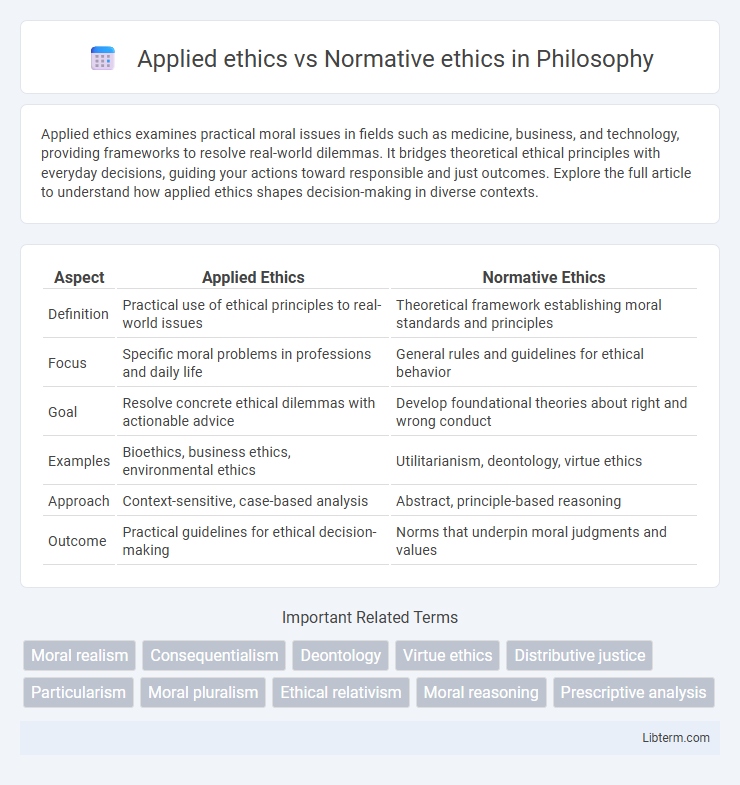Applied ethics examines practical moral issues in fields such as medicine, business, and technology, providing frameworks to resolve real-world dilemmas. It bridges theoretical ethical principles with everyday decisions, guiding your actions toward responsible and just outcomes. Explore the full article to understand how applied ethics shapes decision-making in diverse contexts.
Table of Comparison
| Aspect | Applied Ethics | Normative Ethics |
|---|---|---|
| Definition | Practical use of ethical principles to real-world issues | Theoretical framework establishing moral standards and principles |
| Focus | Specific moral problems in professions and daily life | General rules and guidelines for ethical behavior |
| Goal | Resolve concrete ethical dilemmas with actionable advice | Develop foundational theories about right and wrong conduct |
| Examples | Bioethics, business ethics, environmental ethics | Utilitarianism, deontology, virtue ethics |
| Approach | Context-sensitive, case-based analysis | Abstract, principle-based reasoning |
| Outcome | Practical guidelines for ethical decision-making | Norms that underpin moral judgments and values |
Introduction to Applied and Normative Ethics
Applied ethics examines real-world ethical issues by applying moral principles to specific contexts such as medical, environmental, or business ethics. Normative ethics explores foundational theories that define what actions are morally right or wrong, including deontology, consequentialism, and virtue ethics. Understanding the distinction aids in analyzing ethical dilemmas by providing both theoretical frameworks and practical applications.
Defining Applied Ethics
Applied ethics examines practical moral issues in real-world contexts, focusing on concrete decision-making in areas like medicine, business, and environmental concerns. It translates normative ethics' abstract principles into actionable guidelines that address specific dilemmas. Defining applied ethics involves identifying and analyzing real-life ethical problems using established moral theories to guide judgment and behavior effectively.
Defining Normative Ethics
Normative ethics establishes fundamental principles and standards that guide moral judgments, focusing on what individuals ought to do and the criteria for determining right and wrong actions. Applied ethics uses these normative frameworks to address practical moral issues in fields such as medicine, business, and environmental policy. Defining normative ethics involves identifying core ethical theories like utilitarianism, deontology, and virtue ethics, which provide systematic approaches for evaluating moral conduct.
Key Differences between Applied and Normative Ethics
Applied ethics focuses on the practical application of ethical principles to real-world issues such as medical dilemmas, environmental concerns, and business practices. Normative ethics, by contrast, explores the theoretical foundations and general principles that determine what actions are morally right or wrong, including theories like utilitarianism, deontology, and virtue ethics. The key difference lies in applied ethics addressing specific cases with direct moral guidance, while normative ethics seeks to establish overarching ethical standards and frameworks.
Core Concepts in Applied Ethics
Applied ethics focuses on the practical application of moral principles to real-world issues such as medical decisions, environmental concerns, and business practices. Core concepts in applied ethics include autonomy, justice, beneficence, and non-maleficence, which guide ethical decision-making in specific contexts. Normative ethics, by contrast, explores general theories and principles like utilitarianism, deontology, and virtue ethics that form the foundation for applied ethical judgments.
Central Theories in Normative Ethics
Applied ethics examines practical moral issues through specific contexts such as bioethics, business ethics, and environmental ethics. Normative ethics centers on foundational theories like utilitarianism, deontology, and virtue ethics, which provide systematic frameworks for determining right and wrong actions. These central theories guide moral reasoning by emphasizing consequences, duties, or character traits to establish ethical principles that inform applied ethical decisions.
Interrelationships between Applied and Normative Ethics
Applied ethics relies on the principles established by normative ethics to address specific moral dilemmas in fields like medicine, business, and environmental policy. Normative ethics provides the foundational theories, such as utilitarianism or deontology, which guide the decision-making processes in applied ethical contexts. The interrelationship between them ensures that practical ethical judgments are consistently grounded in coherent moral frameworks.
Real-World Examples of Applied Ethics
Applied ethics addresses practical moral issues in fields like medicine, business, and technology, exemplified by debates on euthanasia, corporate social responsibility, and data privacy. Normative ethics provides foundational theories such as utilitarianism and deontology that guide these real-world decisions by establishing principles of right and wrong. Real-world cases in applied ethics demonstrate how normative frameworks are used to resolve contemporary ethical dilemmas in diverse professional contexts.
Philosophical Debates in Normative Ethics
Philosophical debates in normative ethics center on theories like utilitarianism, deontology, and virtue ethics, each proposing distinct criteria for moral rightness and obligation. Applied ethics uses these frameworks to address concrete moral dilemmas in fields such as medicine, business, and environmental policy. The tension between universal ethical principles and contextual considerations fuels ongoing discourse on how normative ethics informs practical decision-making.
The Significance of Distinguishing Applied from Normative Ethics
Distinguishing applied ethics from normative ethics clarifies the practical application of moral theories versus the theoretical foundation of ethical principles. Applied ethics addresses concrete ethical dilemmas in areas such as biomedical ethics, business ethics, or environmental ethics by using normative theories like utilitarianism or deontology as guides. Recognizing this distinction enhances the precision of ethical analysis and facilitates effective decision-making in real-world contexts.
Applied ethics Infographic

 libterm.com
libterm.com